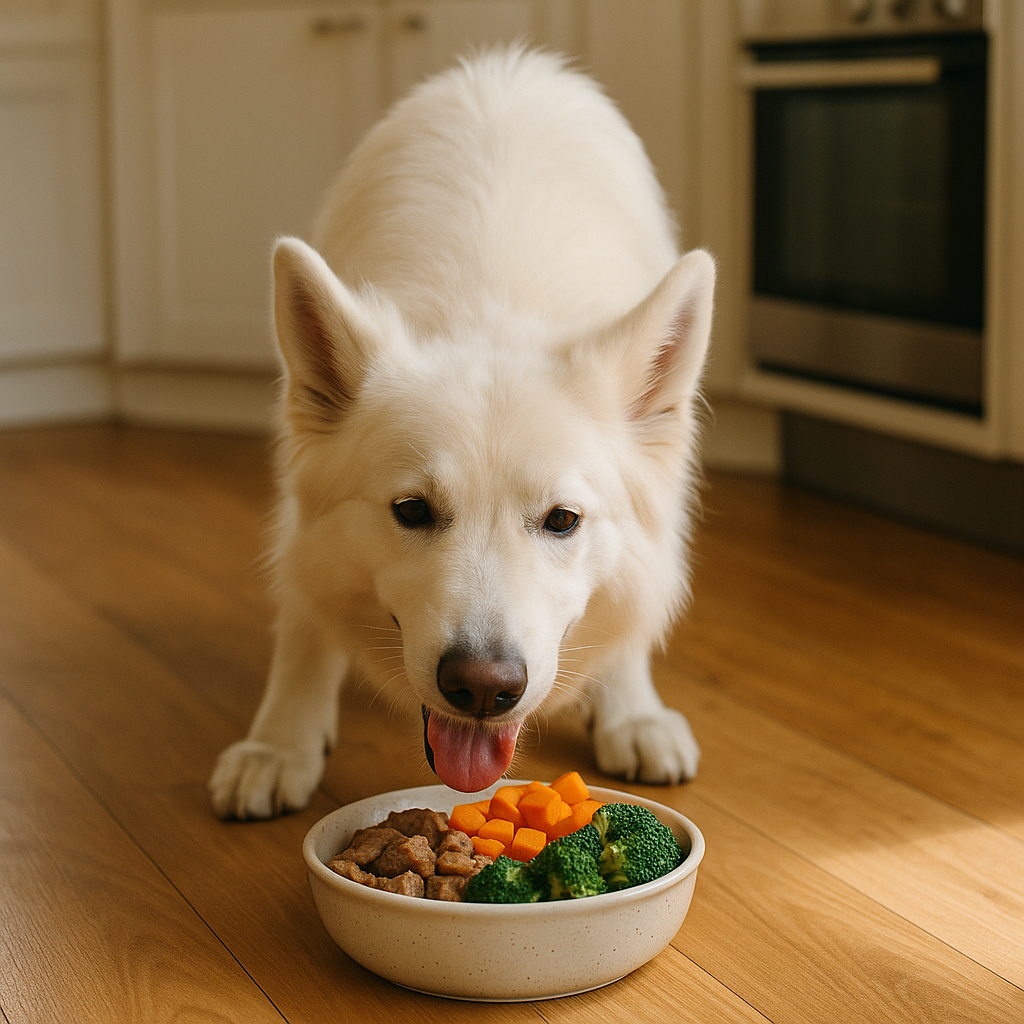| Points clés | Details to remember |
|---|---|
| 🍖 Balanced Diet | Protein sources like lean beef, chicken, or fish |
| 🥕 Vegetables & Fruits | Fiber support from carrots, pumpkin, apples |
| 🌾 Carbs | Energy from rice, oats, sweet potatoes |
| ⚖️ Portion Control | Adjust based on age, weight, activity |
| 🚫 Common Errors | Avoid sudden diet changes and toxic foods |
| 📝 Menu Planning | Weekly rotation prevents nutrient gaps |
Your Swiss Shepherd thrives on a diet that balances proteins, healthy fats, carbohydrates and essential micronutrients. This guide offers a sample weekly menu and highlights feeding mistakes to avoid, so you can support your dog’s energy, coat health and overall well-being.
Why a Proper Diet Matters for Swiss Shepherds
Swiss Shepherds are active, muscular dogs with high metabolic demands. A tailored feeding plan not only fuels their daily adventures but also maintains joint health, muscle tone and a glossy coat. Ignoring their specific requirements can lead to weight fluctuations, digestive upset or nutrient deficiencies.
The Essentials: A well-balanced diet reduces the risk of obesity, strengthens the immune system and supports cognitive function throughout your dog’s life.
Core Nutritional Requirements
Each macronutrient plays a distinct role in your Swiss Shepherd’s health. By understanding their functions, you can choose ingredients that complement one another and cover all bases without relying solely on commercial formulas.
Proteins
Proteins supply amino acids crucial for muscle repair and growth. Swiss Shepherds benefit from high-quality animal proteins—chicken, turkey, fish or lean beef. Aim for at least 25% of daily calories from protein. Puppies may require up to 30% to fuel rapid growth, while seniors can thrive on 20–25% to maintain lean mass.
Fats
Fats deliver concentrated energy, aid in vitamin absorption and support skin health. Omega-3 and omega-6 fatty acids from fish oil or flaxseed help curb inflammation and keep the coat shiny. A target of 10–15% of total calories ensures balanced intake; exceeding 20% may contribute to weight gain if exercise is insufficient.
Carbohydrates
Carbs provide readily available fuel. Complex sources—sweet potatoes, brown rice, oats—offer fiber and steady blood sugar. Keep carbohydrate intake between 30–40% of the total diet. Too much starch can upset digestion, while too little may leave energetic dogs feeling depleted.
Vitamins and Minerals
Micronutrients regulate metabolism, bone density and nerve transmission. Calcium and phosphorus in a 1.2:1 ratio support skeletal integrity, especially during growth. Antioxidants like vitamins C and E bolster immunity. Trace elements—zinc, selenium—are vital for enzyme function. Many homemade diets require a supplement to reach safe levels; consult your veterinarian or a pet nutritionist.
Sample Weekly Menu
Rotating recipes from day to day prevents nutrient gaps and keeps meals exciting. Below is a balanced plan for an adult Swiss Shepherd weighing 30 kg, moderately active.
| Day | Morning | Evening | Snacks |
|---|---|---|---|
| Monday | Chicken breast, brown rice, steamed carrots | Salmon fillet, sweet potato, peas | Apple slices, plain yogurt |
| Tuesday | Ground turkey, pumpkin puree, green beans | Beef mince, quinoa, spinach | Carrot sticks, small cheese cube |
| Wednesday | Oatmeal with eggs and blueberries | White fish, potato mash, broccoli | Banana half, coconut oil drizzle |
| Thursday | Lamb chunks, barley, zucchini | Chicken liver, brown rice, kale | Pumpkin seeds, cucumber slices |
| Friday | Beef tripe, rice, carrots | Duck breast, sweet potato, green peas | Blueberries, boiled egg |
| Saturday | Fish oil scrambled eggs, oats | Pork loin, millet, spinach | Yogurt drop treats |
| Sunday | Chicken bones broth with veggies | Venison, rice, mixed veggies | Apple chips, salmon jerky |
Common Feeding Mistakes and How to Avoid Them
Even the most conscientious owners can slip into habits that compromise nutrition. Recognizing these traps lets you course-correct quickly.
- Overfeeding: Swiss Shepherds gain weight easily once maturity slows down. Measure portions and adjust after monitoring body condition.
- Ignoring Life Stage: Puppies need more calories and calcium; seniors require joint supplements and less fat. Swap formulas accordingly.
- Poor Quality Ingredients: Cheap fillers or low-grade proteins lack bioavailable nutrients. Prioritize whole foods over generic kibble.
- Sudden Diet Changes: Switching meals abruptly can trigger diarrhea. Introduce new recipes over 5–7 days with gradual mixing.
- Unsafe Human Foods: Chocolate, grapes, onions and excessive dairy can harm dogs. For a list of safe and unsafe items, review general guidelines that apply to many breeds.

Monitoring and Adjusting Your Dog’s Diet
Your dog’s needs evolve with age, activity or health status. Regular check-ins prevent nutrient imbalances and weight issues from slipping under the radar.
- Weight Tracking: Weigh monthly and record changes. A 5% shift signals adjustment.
- Physical Exams: Check ribs, waist and hipbones; you should feel but not see them prominently.
- Energy Levels: A drop in playfulness may reflect insufficient calories or nutrient deficiencies.
- Coat Condition: Dull fur hints at fatty acid shortfalls; brittle nails suggest mineral gaps.
- Consult Professionals: A vet or canine nutritionist can fine-tune supplements or change the recipe based on blood tests.

The Essentials
- Balance proteins, fats and carbs in every meal.
- Rotate ingredients weekly to cover all micronutrients.
- Measure portions, adjust by life stage and activity.
- Avoid abrupt changes and toxic human foods.
- Track weight, coat and energy for timely tweaks.
FAQ
How much should I feed an adult Swiss Shepherd daily?
An adult Swiss Shepherd (around 30 kg) typically needs 2,000 to 2,400 kcal per day, split into two meals; adjust based on activity and body condition.
Can I use commercial kibble as the main diet?
High-quality kibble can form the basis of a diet if it lists meat as the first ingredient and meets AAFCO standards. Supplement with fresh foods for variety.
Are raw bones safe for Swiss Shepherds?
Raw meaty bones can provide enrichment and calcium, but always supervise to prevent choking. Avoid weight-bearing bones that may crack teeth.
What are signs of a food allergy in dogs?
Itchy skin, recurrent ear infections or chronic diarrhea can indicate allergies. An elimination diet under your vet’s guidance helps identify triggers.
How do I transition to a homemade diet?
Mix the new homemade recipe with the existing food at a 25% rate, increasing gradually over 7 days until you reach 100% transition.










